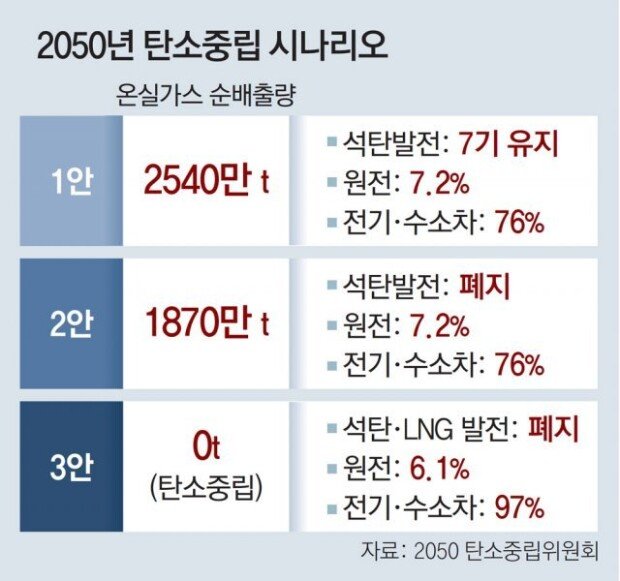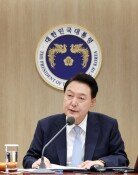S. Korea announces its goal to achieve net-zero emissions by 2050
S. Korea announces its goal to achieve net-zero emissions by 2050
Posted August. 06, 2021 07:26,
Updated August. 08, 2021 10:57

The South Korean government has announced its goal to boost the production of electric and hydrogen vehicles, which represented a meagre 3.4% of total number of vehicles in 2020, to 97% by 2050. Over the same period, the amount of electricity generated from renewable sources will be increased from 6.6% to a maximum of 70.8% over the same period. The Presidential Committee on 2050 Carbon Neutrality Commission has unveiled its first blueprint to go carbon neutral by 2050.
At a press briefing at Seoul Government Complex on Thursday, Commissioner Yun Sun-jin disclosed three scenarios to reduce net carbon emissions, which is the sum of greenhouse gas emissions and greenhouse gas sinks, by 2050 to the following three figures: (1) 25.4 million tons; (2) 18.7 million tons; or (3) 0 ton. These figures have declined by 96.3%, 97.3%, and 100% respectively compared to the 2018 goal of 727.6 million tons.
The likelihood of suspension of coal power plants drew attention. The first scenario assumed the continued coal-fired power generation and maintenance of the existing industrial infrastructures to the greatest possible extent. In the first scenario, the remaining seven coal-fired units that have not yet reached a lifetime of 30 years will continue to operate by 2050. The second scenario assumes the complete shutdown of coal power plants. The third scenario assumes the closure of both coal-fired power generation and LNG power generation. In all three scenarios, power generation from renewable sources, such as solar power and geothermal energy, will take up a larger share: (1) 57% (first scenario); (2) 59.2% (second scenario); and (3) 70.8% (third scenario). Nuclear power occupied 7.2% in the first and second scenario and 6.1% in the third scenario.
“Early phase out of coal generation, which is still favored by the private sector, requires legal basis and compensation measures based on social consensus,” Commissioner Yoon said. In a nutshell, the government cannot compel private parties to cease coal-fired electricity generation. In turn, the Korea Federation for Environmental Movement released a statement, saying the goal of reaching net-zero carbon emissions by 2050 is unviable. The committee will solicit opinions on the three scenarios from the industry, labor groups, civil society, and local governments until September. “The government’s plan will be finalized and announced at the end of October,” Yoon said.
kej09@donga.com · dong@donga.com
Headline News
- Israel prepares for retaliation against Iran
- Samsung reclaims top spot, surpassing Apple in smartphone market
- 77% of Koreans in 20s and 30s are 'Kangaroo Tribe' due to job crisis
- KBO referees embroiled in controversy over ABS decision concealment
- Inflation, oil price surge put double shock on global economy







